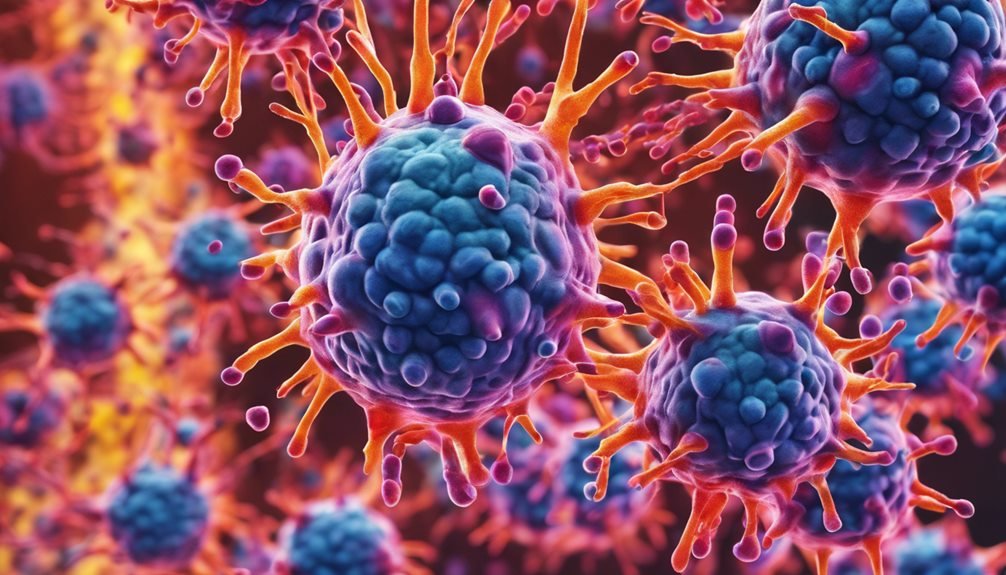When it comes to navigating the complex landscape of cancer treatment and prevention, the role of omega-3 fatty acids emerges as a compelling avenue worth exploring. Their multifaceted effects on cancer cells and signaling pathways offer a tantalizing glimpse into potential therapeutic strategies. However, the intricate interplay between these fatty acids and tumor biology raises intriguing questions that warrant further investigation. Stay tuned to uncover the intricate nuances of how omega-3 fatty acids might hold the key to unlocking new possibilities in cancer management.
Key Takeaways
- Omega-3 fatty acids inhibit cancer cell proliferation.
- They induce apoptosis in cancer cells.
- Omega-3s modulate inflammatory pathways in tumors.
- They enhance sensitivity of cancer cells to treatment.
- Potential for disrupting processes and inhibiting cancer progression.
Omega-3 Fatty Acids Overview
Omega-3 fatty acids are essential polyunsaturated fats that play a crucial role in various physiological processes within the body. These healthy fats are well-known for their numerous health benefits, making them a vital component of a balanced diet. Incorporating omega-3 fatty acids into your meals is of utmost nutritional importance due to their anti-inflammatory properties, which are beneficial for heart health, brain function, and overall well-being.
Research has shown that omega-3 fatty acids can reduce the risk of heart disease by lowering blood pressure and triglyceride levels. Additionally, these fats have been linked to improved brain health, potentially lowering the risk of cognitive decline and enhancing mood.
Omega-3 fatty acids are also believed to have a positive impact on eye health, joint pain, and skin conditions.
Mechanisms of Action
In the realm of cellular function and metabolic pathways, the intricate mechanisms through which polyunsaturated fats exert their physiological effects have been a subject of keen scientific inquiry. Omega-3 fatty acids play a crucial role in modulating cellular signaling and promoting apoptosis induction in cancer cells. Here are some key mechanisms through which omega-3 fatty acids impact cancer development:
- Cellular Signaling: Omega-3 fatty acids can influence various signaling pathways within cells, leading to alterations in gene expression and cellular behavior.
- Apoptosis Induction: These fats have been shown to promote programmed cell death (apoptosis) in cancer cells, helping to prevent their uncontrolled growth.
- Inflammation Modulation: Omega-3 fatty acids possess anti-inflammatory properties that can reduce chronic inflammation, which is linked to cancer progression.
- Oxidative Stress Regulation: By combating oxidative stress, omega-3 fatty acids may protect cells from DNA damage that could contribute to cancer development.
- Angiogenesis Inhibition: Some studies suggest that omega-3 fatty acids could hinder the formation of new blood vessels that tumors need for growth, potentially slowing cancer progression.
Cancer Prevention Potential

Exploring the potential of incorporating omega-3 fatty acids into dietary interventions for cancer prevention reveals a promising avenue for mitigating the risk of tumorigenesis.
Dietary habits play a crucial role in cancer prevention, and the nutritional benefits of omega-3 fatty acids have shown promising results in reducing the risk of various types of cancers.
Studies have highlighted that including sources of omega-3 fatty acids in your diet, such as fatty fish, flaxseeds, and walnuts, can have a protective effect against cancer development.
These healthy fats have been linked to reducing inflammation, promoting healthy cell function, and even potentially inhibiting tumor growth.
Impact on Cancer Cells
Recent research has delved into the intricate mechanisms through which omega-3 fatty acids exert their impact on cancer cells. Omega-3 fatty acids have been shown to influence cancer cells in various ways, particularly affecting cell proliferation and apoptosis induction. Here is a breakdown of how these fatty acids impact cancer cells:
- Inhibition of Cell Proliferation: Omega-3 fatty acids have been found to slow down the rate at which cancer cells divide and multiply, which can help in controlling tumor growth.
- Apoptosis Induction: These fatty acids play a role in promoting apoptosis, the natural process of programmed cell death. By inducing apoptosis in cancer cells, omega-3 fatty acids contribute to limiting the expansion of tumors.
- Altering Cell Signaling Pathways: Omega-3 fatty acids can interfere with specific signaling pathways within cancer cells, leading to a reduction in their survival and proliferation rates.
- Anti-Inflammatory Effects: By reducing inflammation within the tumor microenvironment, omega-3 fatty acids create an unfavorable condition for cancer cell growth.
- Enhanced Sensitivity to Treatment: Studies have suggested that omega-3 fatty acids can enhance the sensitivity of cancer cells to certain anti-cancer treatments, potentially improving treatment outcomes for patients.
Inflammation and Tumor Growth

Investigating the relationship between inflammation and tumor growth reveals a complex interplay between the body's immune response and cancer progression. Inflammatory pathways play a crucial role in shaping the tumor microenvironment, influencing various aspects of cancer development. Chronic inflammation can promote tumor initiation, progression, and metastasis by fostering an environment conducive to cancer cell survival and proliferation.
In the tumor microenvironment, inflammatory cells release signaling molecules that can stimulate cancer cell growth and invasion. Moreover, these inflammatory mediators can induce angiogenesis, the formation of new blood vessels that supply nutrients to the growing tumor. This process enhances the tumor's ability to thrive and spread.
Omega-3 fatty acids have been shown to modulate inflammatory pathways, potentially mitigating the pro-tumorigenic effects of chronic inflammation in the tumor microenvironment.
Understanding the intricate relationship between inflammation and tumor growth is essential for developing targeted therapeutic strategies that aim to disrupt these processes and inhibit cancer progression. Omega-3 fatty acids may offer a promising avenue for intervention by modulating inflammatory responses and altering the tumor microenvironment to impede cancer development.
Clinical Studies and Findings
Within the realm of clinical studies exploring the impact of omega-3 fatty acids on cancer, researchers have delved into a multitude of investigations to decipher the potential benefits of these essential nutrients in cancer prevention and treatment. These studies have provided valuable insights into the effects of omega-3 fatty acids on cancer treatment outcomes and patient adherence.
Here are some key findings from clinical studies:
- Improved Treatment Outcomes: Some studies suggest that omega-3 fatty acids may enhance the effectiveness of certain cancer treatments, leading to better outcomes for patients.
- Reduced Side Effects: Omega-3 fatty acids have been linked to a potential reduction in the side effects of cancer treatments, improving the overall quality of life for patients.
- Enhanced Patient Adherence: Research indicates that incorporating omega-3 fatty acids into cancer treatment plans may improve patient adherence to prescribed therapies.
- Potential for Personalized Treatment: Clinical evidence supports the idea that omega-3 fatty acids could play a role in personalized cancer treatment strategies.
- Promising Results in Clinical Trials: Preliminary results from ongoing clinical trials show promising outcomes regarding the use of omega-3 fatty acids in cancer therapy.
Types of Cancer Studied

Various types of cancer have been extensively studied in the context of omega-3 fatty acids' potential impact on cancer prevention and treatment. Among these, breast cancer and prostate cancer have garnered significant attention.
Studies have shown that omega-3 fatty acids, particularly eicosapentaenoic acid (EPA) and docosahexaenoic acid (DHA), may play a role in reducing the risk of breast cancer development. These fatty acids have been associated with anti-inflammatory effects in breast tissue, potentially inhibiting tumor growth and metastasis. Additionally, omega-3 fatty acids may enhance the effectiveness of certain breast cancer treatments, improving outcomes for patients.
In the case of prostate cancer, research suggests that omega-3 fatty acids could exert protective effects. Some studies indicate that a higher intake of omega-3 fatty acids may be associated with a reduced risk of developing aggressive prostate cancer.
However, the relationship between omega-3 fatty acids and prostate cancer is complex, with some studies showing conflicting results. Further research is needed to fully understand the impact of omega-3 fatty acids on prostate cancer development and progression.
Combination Therapies
Exploring the potential synergies between omega-3 fatty acids and conventional cancer treatments opens up a promising avenue in cancer research. Incorporating omega-3 fatty acids as complementary treatments alongside standard cancer therapies can potentially enhance efficacy and improve patient outcomes.
When considering combination therapies, it's crucial to take into account the following:
- Complementary Treatments: Omega-3 fatty acids can complement traditional cancer treatments, potentially enhancing their effectiveness.
- Side Effects: Understanding how omega-3 fatty acids may interact with chemotherapy or radiation therapy can help mitigate side effects and improve overall treatment tolerance.
- Efficacy: Studies suggest that combining omega-3 fatty acids with conventional cancer treatments may lead to improved treatment efficacy and outcomes.
- Patient Outcomes: Monitoring patient responses to combination therapies can provide valuable insights into the impact of omega-3 fatty acids on overall treatment success.
- Research: Further research is needed to fully understand the mechanisms behind the potential benefits of combining omega-3 fatty acids with standard cancer treatments.
Embracing combination therapies that include omega-3 fatty acids holds promise for advancing cancer care and improving patient well-being.
Dietary Sources and Supplementation

Dietary sources and supplementation play a crucial role in ensuring adequate intake of omega-3 fatty acids, which are essential for overall health and potentially beneficial in cancer management. Including sources rich in omega-3s like fatty fish (salmon, mackerel, sardines), flaxseeds, chia seeds, and walnuts in your diet can contribute to reducing cancer risk. These foods contain eicosapentaenoic acid (EPA) and docosahexaenoic acid (DHA), two types of omega-3s with known health benefits.
Supplementation can also be considered to meet omega-3 requirements, especially for individuals who may not consume enough through diet alone. Studies suggest that omega-3 supplements may aid in reducing inflammation, which is a key factor in cancer development.
However, it's essential to consult with a healthcare provider before starting any supplementation regimen, as excessive intake can have adverse effects.
Dosing Recommendations
To optimize the potential benefits of omega-3 fatty acids in cancer management, understanding appropriate dosing recommendations is pivotal. The optimal dosage of omega-3 fatty acids for cancer patients can vary depending on the type and stage of cancer, as well as individual factors like age and overall health status. Here are some key points to consider regarding dosing recommendations:
- Individualized Approach: Tailoring the dosage to the specific needs and conditions of the patient is crucial for maximizing treatment efficacy.
- Consultation with Healthcare Provider: Before starting any omega-3 supplement regimen, it's essential to seek guidance from a healthcare provider or a registered dietitian.
- Monitoring and Adjusting: Regular monitoring of omega-3 levels in the blood can help in adjusting the dosage to achieve optimal levels for therapeutic benefits.
- Balancing Omega-3 and Omega-6: Maintaining a balance between omega-3 and omega-6 fatty acids is important for overall health and treatment effectiveness.
- Clinical Trials: Referencing ongoing clinical trials and research studies can provide insights into the most effective dosages for different cancer types.
Risks and Considerations

When considering the risks and considerations associated with omega-3 fatty acids in cancer management, it's imperative to delve into potential adverse effects and interactions that could impact treatment outcomes.
Potential side effects of omega-3 fatty acids include gastrointestinal disturbances, such as diarrhea or indigestion, as well as a risk of excessive bleeding, especially when combined with blood-thinning medications. It's crucial to consult with healthcare providers before initiating omega-3 supplementation, as dosage adjustments may be necessary to prevent these adverse effects.
Moreover, interactions with certain medications, such as chemotherapy drugs, can affect treatment efficacy. Omega-3 fatty acids have been shown to enhance the efficacy of some chemotherapy agents while potentially reducing the effectiveness of others. Understanding these interactions is vital for optimizing cancer treatment outcomes.
Therefore, close monitoring and communication with healthcare professionals are essential to ensure the safe and effective use of omega-3 fatty acids in cancer management.
Future Research Directions
Exploring the realm of future research directions surrounding omega-3 fatty acids in cancer holds immense promise for advancing our understanding of their potential therapeutic applications. In the pursuit of uncovering more about the role of omega-3 fatty acids in cancer treatment, focusing on long-term effects and novel applications is crucial. Here are some key areas for future investigation:
- Long-term effects: Understanding how omega-3 fatty acids impact cancer progression over extended periods can provide valuable insights into their efficacy as a long-term treatment option.
- Novel applications: Exploring innovative ways to incorporate omega-3 fatty acids into cancer treatment regimens, such as combination therapies or targeted delivery systems, could enhance their therapeutic benefits.
- Mechanistic studies: Investigating the underlying mechanisms through which omega-3 fatty acids exert their anti-cancer effects can pave the way for the development of more targeted and effective treatments.
- Clinical trials: Conducting well-designed clinical trials to evaluate the safety and efficacy of omega-3 fatty acids in cancer patients will help validate their potential therapeutic value.
- Population studies: Analyzing large cohorts to assess the impact of omega-3 fatty acid intake on cancer incidence and outcomes can provide valuable population-level insights.
Frequently Asked Questions
Can Omega-3 Fatty Acids Replace Conventional Cancer Treatments?
You shouldn't rely solely on omega-3 fatty acids to replace conventional cancer treatments. While omega-3s may have some benefits in cancer prevention and treatment effectiveness, they aren't a standalone cure.
Conventional treatments like chemotherapy, radiation, and surgery have been extensively researched and proven effective in combating cancer. Additionally, omega-3 supplements can have side effects and may interact with other treatments, so always consult with your healthcare provider for a comprehensive treatment plan.
Do Omega-3 Supplements Have Different Effects on Various Cancer Types?
Did you know that omega-3 supplements can have varying effects on different cancer types? This underscores the complexity of cancer prevention mechanisms.
Research suggests that omega-3 fatty acids may impact cancer metastasis differently based on the type of cancer. Understanding these nuances is crucial for tailoring treatment approaches.
Are There Specific Omega-3 Dosages for Different Stages of Cancer?
For individuals at different stages of cancer progression, omega-3 dosing may vary. Research suggests that specific dosages of omega-3 fatty acids could play a role in supporting cancer patients. Consult with your healthcare provider to determine the appropriate omega-3 supplementation for your specific situation.
Tailoring the dosage to your cancer stage can potentially optimize the benefits of omega-3s in your overall treatment plan.
Can Omega-3 Fatty Acids Prevent Cancer Recurrence?
Omega-3 fatty acids play a crucial role in cancer prevention by potentially reducing the risk of cancer recurrence. Studies suggest that incorporating omega-3s in your diet may help decrease inflammation, a key factor in cancer development and recurrence. By consuming foods rich in omega-3 fatty acids or taking supplements, you might support your body in fighting cancer cells and lowering the chances of cancer returning. Always consult with your healthcare provider for personalized advice.
How Do Omega-3 Fatty Acids Interact With Chemotherapy Drugs?
How do omega-3 fatty acids interact with chemotherapy drugs? Do they enhance treatment synergy or hinder drug interactions?
Studies suggest that omega-3 fatty acids might increase the effectiveness of chemotherapy by reducing inflammation and enhancing drug delivery to cancer cells. This potential synergy between omega-3s and chemotherapy drugs could lead to better treatment outcomes for individuals battling cancer.
Further research is needed to fully understand the extent of these interactions.
Conclusion
As you navigate the complex world of cancer prevention and treatment, remember that omega-3 fatty acids are like the calm seas guiding you towards better health. Just as the gentle waves soothe the shore, these essential nutrients can help reduce inflammation, inhibit tumor growth, and enhance the effectiveness of traditional treatments. Embrace the power of omega-3 fatty acids as your anchor in the storm of cancer management, leading you towards brighter horizons.





